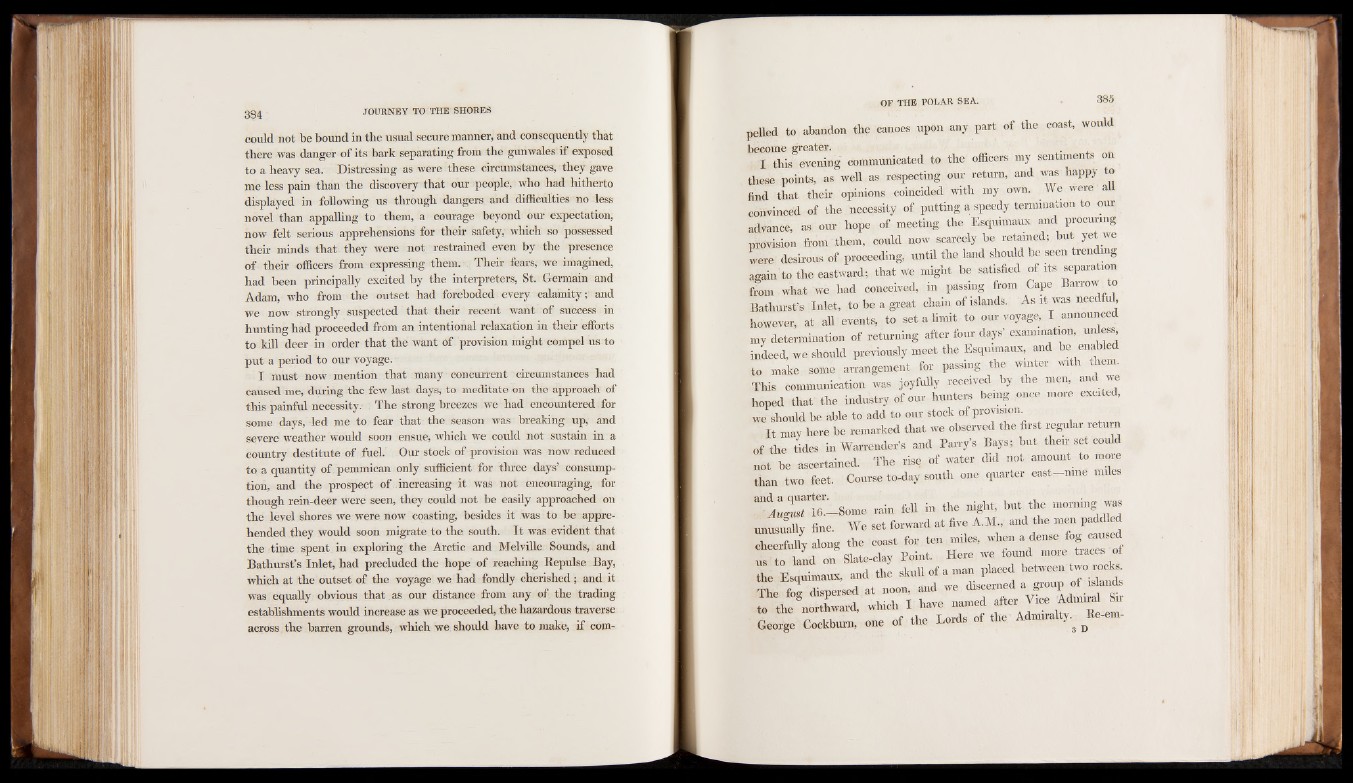
could not be bound in the usual secure manner, and consequently that
there was danger of its bark separating from the gunwales if exposed
to a heavy sea. Distressing as were these circumstances, they gave
me less pain than the discovery that our people, who had hitherto
displayed in following us through dangers and difficulties no less
novel than appalling to them, a courage beyond our expectation,
now felt serious apprehensions for their safety, which so possessed
their minds that they were not restrained even by the presence
of their officers from expressing them. Their fears, we imagined,
had been principally excited by the interpreters, St. Germain and
Adam, who from the outset had foreboded every calamityand
we now strongly suspected that their recent want of success in
hunting had proceeded from an intentional relaxation in their efforts
to kill deer in order that the want of provision might compel us to
put a period to our voyage.
I must now mention that many concurrent circumstances had
caused me, during the few last days, to meditate on the approach of
this painful necessity. The strong breezes we had encountered for
some days, led me to fear that the season was breaking up, and
severe weather would soon ensue, which we could not sustain in a
country destitute of fuel. Our stock of provision was now reduced
to a quantity of pemmican only sufficient for three days’ consumption,
and the prospect of increasing it was not encouraging, for
though rein-deer were seen, they could not be easily approached on
the level shores we were now coasting, besides it was to be apprehended
they would soon migrate to the south. It was evident that
the time spent in exploring the Arctic and Melville Sounds, and
Bathurst’s Inlet, had precluded the hope of reaching Bepulse Bay,
which at the outset of the voyage we had fondly cherished; and it
was equally obvious that as our distance from any of the trading
establishments would increase as we proceeded, the hazardous traverse
across the barren grounds, which we should have to make, if compelled
to abandon the canoes upon any part of the coast, would
becIo mthei sg reevaetnerin. g communicated to the officers my senti.ments on
these points, as well as respecting our return, and was happy to
find that their opinions coincided with my own. We were a
convinced of the necessity of putting a speedy termination to our
advance, as our hope of meeting the Esquimaux and procuring
provision from them, could now scarcely be retained; but yet we
were desirous of proceeding, until the land should be seen trending
again to the eastward; that we might be satisfied of its separation
from what we had conceived, in passing from Cape Barrow to
Bathurst’s Inlet, to be a great chain of islands. As it was needful,
however, at all events, to set a limit to our voyage, I announced
my determination of returning after four days’ examination, unless,
indeed, we should previously meet the Esquimaux, and be enabled
to make some arrangement for passing the winter with them.
This communication was joyfully received by the men, and we
hoped that the industry of our hunters being once more excited,
we'shouldbeabletoaddtoourstockofproyisioiL
It may here be remarked that we observed the first regular return
of the tides in Waxrender’s and Parry’s Bays; but their set could
not be ascertained. The rise of water did not amount to more
than two feet. C o u r s e to-day south one quarter east-nine miles
an^ i T l 6 r-S om e rain fell in the night, but the morning was
unusually fine. We set forward at five A.M and the ™^ padd e
cheerfully along the coast for ten miles, when a dense fog caused
us to land on Slate-clay Point. Here we found more traces of
The Esquimaux, and the skull of a man placed
The fog dispersed at noon, and we discerned a^ g roujof iskinds
to the 'northward, which I have named
George Cockburn, one of the Lords of the Admiralty Ke-em